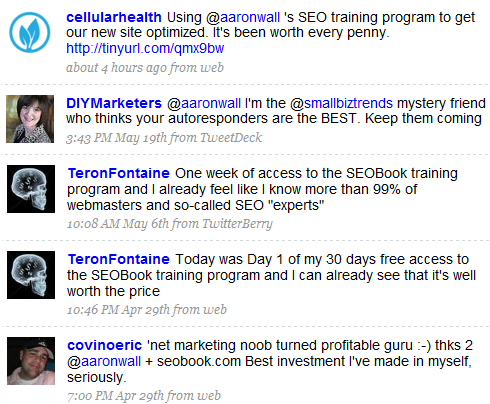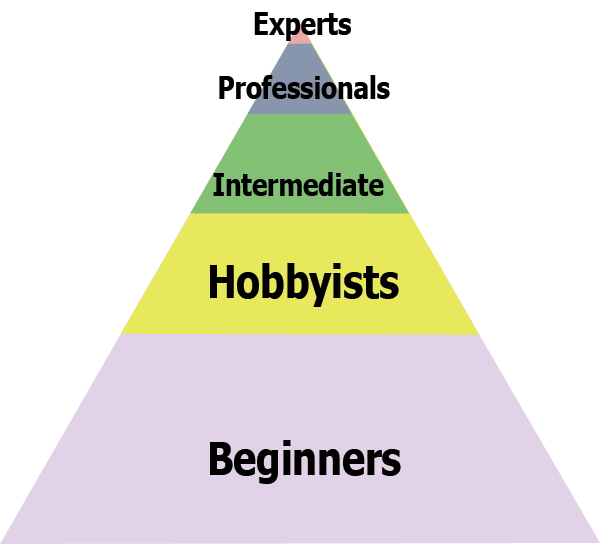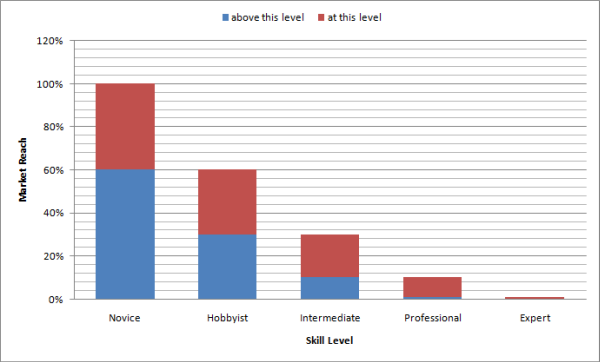Social Cues & Increasing Sales
Honesty Tax
The anonymous nature of the web acts as a tax on anyone who is an honest merchant. Sales are driven by perceived value, and many marketers spend 90%+ of their time & effort on front end marketing and optimizing their sales channels, while providing little to no substance to anyone who buys from them. By the time those customers get to people like us, they are already more distrusting, cynical, and jaded due to having been scammed - in many cases multiple times.
To someone new to a field, scams often look more legitimate than the real thing. Just ask anyone who has spent their share of the 100's of millions of dollars on acai diet reverse billing fraud promoted through fake blogs advertised on the Google content network.
Quality vs Perceived Quality
In terms of sales, the quality of the product or service is typically nowhere near as important as how much mindshare you have. That last sentence sorta reveals one of the major weaknesses of most non-salespeople. You can't just focus on having the best product and think that will be enough. You have to use push marketing until you build enough momentum that it starts becoming a force of its own. And it needs to be periodically refreshed through advertising, public interaction, and viral marketing.
This is where advertising, building trust, website credibility, and cumulative advantage play a big roll in making a business ubiquitous so the perceived risk of being a customer is much lower.
Word of mouth marketing is great, but you have to encourage it, and promote it.

Scaling a Website
The good news is you do not need a lot of employees to look large, so long as you are good at structuring your customer interactions. Through the above strategies (and being super-efficient), our site (which has 2.5 employees and has its highest value portions locked up as member's only content) gets more traffic than competing businesses with 20 employees and some of the largest public forum websites (with 10x as many pages in Google & no barrier to entry).
The Alexa blog recently referenced the success of our site's current model:
seobook.com gets more traffic than seochat.com and seomoz.org. But how do they do it? Loyalty. Despite getting less traffic from search engines, and despite having fewer links than seomoz, and despite scaring away potential customers with aggressive marketing [editorial note: the quoted article was published while we were testing a pop up that we are no longer testing], seobook is doing quite well. They are converting visitors to customers, and turning those customers into regular visitors.
The take-away lesson is that good SEO is important, but it can't compete with a loyal and engaged user-base. Seobook.com is a perfect case in point.
Building Loyalty
Such loyalty does not come easy though. This quote represents the barrier you have to overcome if you want to build a lasting online community that matters:
In effect, this guy who has twenty thousand friends is completely alone in the real world.
...
In this age of great digital connectedness, we increasingly find ourselves clinging to illusions of intimacy, adrift in a sea of anonymity, surrounded by the great faceless, nameless masses from which no commonality can be extracted.
What barriers are preventing people from getting the most out of your community? What can you do to make your interactions more life-like? How open should your community be? What pieces should you focus on building most aggressively? How can you make it grow larger without damaging the quality of the community? How many customers can you have before you need to hire more people? Who should you hire? What should they work on? Where can you add value to your customer's experience? How can you leverage your knowledge most efficiently?
Ubiquity
Growing a community is a quite tricky process because every type of marketing causes expected and unexpected consequences. Our ebook, when priced at $79, was coupled with a brand that was seen far and wide. The price-point was so low that it was an impulse purchase that reached virtually every piece of the market - entrepreneurs, small businesses, b2b, retailers, Fortune 500's, hedge funds, etc. Direct interaction with 10,000+ customers made us quite good at knowing what questions are commonly asked, and how to answer them accurately and efficiently. The most common questions got worked into the content.
Death of Ubiquity
The growing complexity of search (particularly the subjective nature of Google hand edits), the general low perceived value of ebooks (largely destroyed by scammers), and Google teaching people to steal our ebook (via suggested "torrent" searches) killed our old business model. Luckily we saw those market changes coming, and shifted our business model in time to more than double our revenues while focusing on higher quality customers.
The minute a profitable business model appears on the web, many forces work to commoditize and disintermediate it. The only ways to stop that are to build a platform that other people build on, or to build deeper relationships with customers.
One of the most important points of Seth's Tribes is that to build a community you have to have outsiders.
Growing a Community
Growth of a community beyond a certain point gets tricky though. Any membership site has some level of decay rate and some level of growth. If you push into markets where you don't fit well then you (temporarily) increase your revenues while lowering your lifetime customer value, lowering average customer quality, polluting your community with people that do not fit, and increasing your maintenance cost of advertising to less receptive markets and supporting transient short-term members.
Rather than trying to get more members, it often makes sense to increase what you get from current members, and look for ways to increase the value delivered to members to increase member stay time.
Price as a Filter
Even though our training program has a similar price-point as the ebook did, it is perceived as being far more expensive because it is recurring. That increases the perceived risk to some of the potential customers who are less committed to learning SEO. This higher perceived cost shaped our community to filter out some of the worst pieces of the market (like the people who buy lots of internet marketing junk on Clickbank and reverse charge most of it) and attract many high quality customers (many of our members have 20x more the business experience and know-how than I do). But it makes it harder for the brand the site to be as relevant to as wide of a group as the old business model was.
More Filters
Our price-point and the stuff we write about on the blog likely makes many people think that we aim for high end experienced web professionals who have a lot of SEO experience. While that perception keeps our forum levels above the level of quality anywhere else on the web, it also causes us to miss 90%+ of the market.
The approach of simply having hands down the best customers, the best customer service, and delivering the highest level of value (which causes people to stay subscribed for a long time) was the best approach to take when running this site as a 2.5 person business, because churn is expensive when you do marketing, public relations, advertising, quality assurance, content creation, customer support, and customer interaction (all while keeping up with changes in the market). We still want to keep our core customers, but might try expanding.
Appealing to More Beginners
You are not your own customer. I am not my own customer. Designing for yourself gives you a good chance of creating something of value, but most of the buying market for how to information are people new to the field.
Put another way, beginners are the largest market segment, and everyone was a beginner at one point in time.


This is precisely why email list internet marketers make so much money. There is always a new, desperate, and gullible crop to feed off of - an Eternal September. And until they get burned a few times and hardened by the market (and/or go bankrupt) they convert at rates well above what other market segments convert at. Greed makes it easy to make poor financial decisions, especially when matched against seasoned marketers and promises of automated wealth generation.
If we are to expand, we will likely need to reach some of the market that thought our site was too advanced for them. Our offers won't be as hyped as the email guys, but we do have a lot of channels we could use much more effectively. Our training program is certainly easy enough for most beginners to get it, but we need to make our marketing reflect that. My wife used to do offline tech sales stuff, and she is going to help try to do some of the online stuff for this site too. Given that she is up for helping out, I think we can grow the site again...there are lots of things we could make better (like re-doing the intro video, making more video content, and building a few more tools) that I had not got around to because the community was about as big as it made sense to be without more labor.
Websites and tools can be great for both beginners and experts. We just have to figure out how to better reach both market segments without alienating the other. :)




Comments
"The minute a profitable business model appears on the web, many forces work to commoditize and disintermediate it."... Wow, that sentence is a crude reality for those who are trying to get profits from the web... Internet Marketing is a non-stop process of getting new ideas of generating income.
By the way, your book was my start point of SEO and I am really grateful for all the things I was able to learn there. It is an excellent book.
Glad you found it helpful omarinho :)
SEOBook.com certainly has a valid business model and a loyal community of suppporters/consumers.
The main reason, in my opinion, is the quality of the offering and the need that it satisfies.
And as traditional advertising mediums (both offline and online) become more and more ineffective, I can envision a day when one of the only feasible business models will be a premium offering that satisfies a specific need(s) and is not singularly supported by ad revenue (say bye bye to print institutions, radio networks and TV networks).
But that's just one man's opinion...only time will tell...
I think ad models will still work for a lot of sites, but they will become harder and harder to build from as everyone uses everyone else's data and websites against each other.
The one thing that will really keep pushing free is an imbalance of intention. People who are new(ish) to the network will continue to give away much of their best content to pull in a few scraps of attention. Some of the best existing channels will be forced to match that effort, or eventually be rendered a relic of the past.
You are your own customer. But maybe at a different point in time, with a different level of understanding. Or maybe from the POV of having a different personality or character - 'What would I do if I was such and such a person?'
I agree with that Richard. I think when I was newer, less knowledgeable, and more excited, it made selling much easier because I was writing more at the level of more potential customers. As I have gained knowledge and grew a bit more cynical about Google I think both of those increased the value of my perception & understanding of the web, while being a bit of a slight negative influence on conversion rates.
hey aaron...what tool do you use to make those images..like where you grab a section of twitter posts..
I use Snagit. Great program :)
I think growing your audience might not be as good a move as you think right now, Aaron... because I certainly plan on joining your forums in the future (and am known to be an obsessive forum poster) and that alone might give you a hard time replying to all the posts ;) (the only reason I haven't joined yet is that I'm trying to be much more action-oriented than i was in the past, thus joining a forum/training program isnt a good idea for me - right now).
Anyway on a more serious note, I agree with omarinho. I think I read your seobook twice or three times...including certain parts that I read again and again over the last 2 years..and think only someone who didnt read it thoroughly enough wouldnt understand the value of it, I still have some phrases from it pop up in my mind every now and then such as "If you create an idea that is hard to dislike (...), you're likely to gain many links" - I'm wondering how many people (who just scanned through the book once instead of reading it thoroughly) actually grasped that sorta stuff. Im sure the (few) people who Ive read statements such as "his book wasnt really that good..you could have gathered the information from everywhere on the web.." probably didnt.
But hey dont raise the price point too high or I might not join in the future! ;)
EDIT: Are your members' websites ever discussed on the forums with occasional recommendations from you/other members on what they'd do exactly (or do you have more of a WMW kind of policy keeping threads link-less, etc. so they dont get spammy)? Of course, I dont mean "here's my site, how do I get links to it??" kind of questions, but more specific ones. just curious!
Since we are not public we don't have to worry about link drops. We analyze lots of member websites every day. :)
nice to hear - makes joining in the future even more tempting ;)
Add new comment